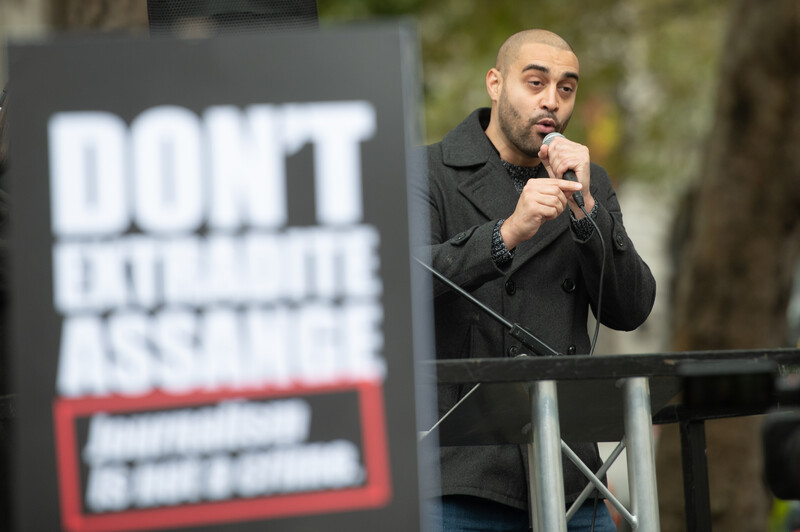The Electronic Intifada 12 April 2022

Rapper Lowkey, speaking at a rally in support of the persecuted journalist Julian Assange.
AvalonFor more than a decade, Lowkey has been regarded as an enemy by Israel’s lobbying network.
Back in 2011, the right-wing Jewish Chronicle described the London-based rapper’s ability to reach a young audience as a “potential nightmare.”
Judging by more recent attacks against Lowkey, it would seem that his determination to raise awareness about how Palestinians live under an apartheid system has indeed kept Israel’s supporters awake at night.
Unable to find flaws in his arguments, the lobby has told lies about him.
An example of how he has been deliberately misquoted came after he made a live appearance on BBC radio in 2017.
He performed “Letter to the 1%,” a track pledging solidarity with “victims of the globalized cosa nostra.” Despite obviously referencing the Sicilian mafia, The Jewish Chronicle falsely charged that he had uttered the anti-Semitic phrase “kosher nostra.”
Due to a threatened lawsuit, the newspaper published a retraction.
Smears step up a gear
The smear campaign against Lowkey has stepped up a gear over the past six months.
In December 2021, the rapper was booked for a gig in London’s Jazz Cafe. The venue came under pressure to call off the show, which celebrated the 10th anniversary of his album Soundtrack to the Struggle.
And in March this year, Lowkey was scheduled to speak at a conference organized by Britain’s National Union of Students (NUS), marking its centenary.
As soon as the lineup for the event was announced, the journalist Theo Usherwood wrote a series of tweets.
Usherwood, political editor with the radio station LBC, highlighted comments made by Lowkey about how the mainstream media was “weaponizing the Jewish heritage” of Volodymyr Zelensky, the Ukrainian president, in order to “stave off” questions about far-right groups in Ukraine.
Although Lowkey’s analysis was based on demonstrable facts, Usherwood described it as “theorizing.”
Usherwood is considered an ally by the pro-Israel lobby, as the blogger David Collier has made clear.Vilified
Following Usherwood’s tweets, The Daily Mail, one of Britain’s most widely read newspapers, published an article on the event to which Lowkey had been invited.
The article featured comments from Nina Freedman, who heads the Union of Jewish Students. She claimed that Lowkey had “spread conspiracies about Jewish students, 9/11 and the war in Ukraine.”
Although Freedman was quoted at length, the article did not elaborate on the “conspiracies” she had in mind.
It also did not mention that the Union of Jewish Students is financed by the Israeli embassy in London, as an investigation by Al Jazeera has revealed.
The NUS was vilified by the Campaign Against Antisemitism – another Israel lobby group – over how it responded to complaints about the invitation to Lowkey.
The NUS recommended that people who took umbrage at Lowkey’s views could avoid listening to him and even offered a “safe space” where they could go during his appearance. Yet the Campaign Against Antisemitism distorted that offer as a suggestion that “the Jewish students literally segregate themselves.”
Some elected politicians even got involved in efforts to bully the NUS.
Andrew Percy, a member of the British Parliament, described the offer of a “safe space” to offended students as “sinister.” He called on Larissa Kennedy, president of the NUS, to resign.
Another MP Robert Halfon contended that Britain’s Equalities and Human Rights Commission should investigate the NUS for what he alleged was “institutional anti-Semitism.”
Both Percy and Halfon have held senior positions with Conservative Friends of Israel, a pressure group inside Britain’s ruling party.
“Own goal”
The NUS capitulated to the pressure.
Lowkey was dropped from the conference to which he was invited. Instead, it was proposed that he could have a role in a fringe event marking the NUS centenary.
When Lowkey refused to accept that proposal, the NUS claimed– dishonestly – that he had simply pulled out of the conference.
The bullying did not go unchallenged.
The group Palestine Action – best known for smashing up Israeli weapons factories – protested against how Lowkey had been canceled by scaling the roof of the venue where the NUS celebrated its 100th birthday.
According to Palestine Action, a number of students active in the NUS took part in that protest.
Lowkey is also the target of a campaign aimed at removing his music from the major streaming website Spotify. That campaign has been launched by Luke Akehurst from the lobby group We Believe in Israel.Speaking to The Electronic Intifada, Lowkey pointed out that Akehurst’s group is known to work with Israel’s government.
The calls for censorship – which have been opposed by the actor Mark Ruffalo, the rapper Wretch 32 and the rock star Roger Waters among many others – are “ultimately an own goal,” Lowkey added.
“Artists and musicians should never have to fear threats to their livelihood or person for the music they make,” he added. “We will not be silenced on Palestine. Not now, not ever.”
Kit Klarenberg is an investigative journalist exploring the role of intelligence services in shaping politics and perceptions. Twitter: @KitKlarenberg.
Tags
- Lowkey
- The Jewish Chronicle
- National Union of Students
- Theo Usherwood
- BBC
- LBC
- Russia-Ukraine conflict 2022
- The Daily Mail
- Nina Freedman
- Union of Jewish Students
- Al Jazeera
- Volodymyr Zelensky
- David Collier
- Andrew Percy
- Robert Halfon
- Conservative Friends of Israel
- Equalities and Human Rights Commission
- Palestine Action
- Mark Ruffalo
- Wretch 32
- Roger Waters
- Spotify





